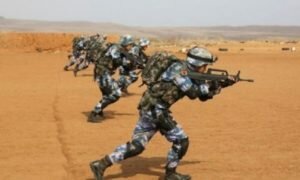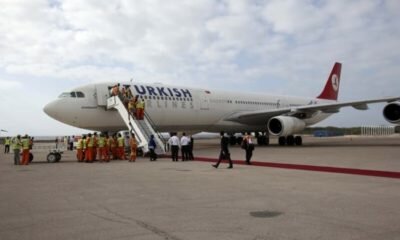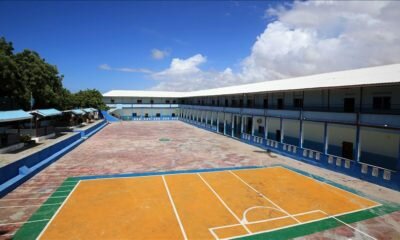Somali News
Turkey provides education to Somali refugee children
Published
2 months agoon

 Turkey-based aid agencies will provide education to more than 250 orphaned Somali children living in Kenya’s north eastern town of Dabaab.
Turkey-based aid agencies will provide education to more than 250 orphaned Somali children living in Kenya’s north eastern town of Dabaab.
Turkish Deniz Feneri Association in collaboration with the Turkish Cooperation and Coordination Agency (TIKA) has opened Aysel and Serif Findikkaya Orphanage and Integrated Primary School for the children, who were orphaned while fleeing volatile situations in war-ravaged Somalia.
Most of the children were orphaned at an early stage when their parents left Somalia to seek refuge in Kenya’s Dadaab refugee complex.
Dadaab camp, located in northern Kenya’s Garissa Country, is home to over 400,000 refugees, mostly Somalis.
“Now we have a bed to sleep on, we have education, food and water, something that we are not used to have. I am thankful that our lives will change,” said a 12-year-old Hamid Mohammed, who is a beneficiary of the Turkish donation.
According to a UNICEF and 2012 Kenya Aids indicator survey, there were 2.6 million orphans in 2012 in the East African country.
Emre Yuksek, the Nairobi coordinator for TIKA, said: “Despite the crucial role that education plays for disadvantaged communities, it is ignored by aid donors and governments. The impact of this is devastating.”
He said Turkey would like to establish and encourage similar institutions like the Aysel and Serif Findikkaya Integrated Primary School in Africa.
Mehmet Cengiz, the director general of the Deniz Feneri Association, said the school and orphanage will host 256 students.
Cengiz said 180 of total 256 children will be boarding students. “May this facility be a home to thousands of orphans and children who are deprived of formal education.”
Mehmet Findikkaya, who is the main donor to the construction of the school, promised that the children will get free education.
You may like
-


Yesilcam overtakes Hollywood and Bollywood in Somalia
-


Base race in the Horn of Africa
-


Turkey’s foray into Somalia is a huge success, but there are risks
-


Somalia: Turkish foundation’s school hosts 500 students
-


Trump warns Erdogan to avoid clash between U.S., Turkish forces
-


Somalia, Turkey ink trade deals to boost bilateral ties
Somali News
Job and pay gap between local Somali graduates and diaspora returnees
Published
18 hours agoon
Feb 27, 2018
![]() Young graduates claim they are being overlooked for the best paid jobs in Somalia by employers favouring Somalis returning from overseas with foreign credentials.
Young graduates claim they are being overlooked for the best paid jobs in Somalia by employers favouring Somalis returning from overseas with foreign credentials.
Most top officials in the federal government, non-governmental organization workers as well as leading business employees have spent time abroad and have foreign passports.
The vice-speaker of the Somali parliament, Abdiweli Sheik Ibrahim Mudey, told Radio Ergo that top officials in different sectors accept the diaspora more readily. Mudey said he has spoken several times to government officials about giving priority to youth who studied under difficult conditions in the country, in order to encourage them.
Sahra Sheik Yusuf, a student of business administration at Mogadishu university, plans to travel oversees after completing her studies in two years, as she has no hope otherwise of getting a job in the country.
“I don’t think I will get a job with the government because I don’t have a foreign passport. The government prefers and gives job opportunities to the people from abroad,” Sahra told Radio Ergo.
Sahra said the best job vacancies are offered to Somalis living outside the country. The few local graduates that get jobs use their connections or clan affiliations.
Even then, local graduates claim, they are paid less than those coming home from abroad.
Young people say they are pushed to migrate oversees, often taking very dangerous routes, so they can also get foreign documents to back-up their CVs and stand a better chance in the job market.
Omar Osman Mohamed, who graduated in 2016 in public administration from the University of Somalia, said he has been overlooked seven times after an interview.
“Every time I go for a job interview, they tell me they will contact me, but I don’t get any feedback, whether it was success or failure,” he said. He is convinced that young people studying in Somalia at being discriminated against in the job market. “The main reason I am not able to secure a job is certainly not because of my knowledge or lack of ability,” he added.
Omar knows university peers who decided to migrate to optimize their job chances, hoping to come back with foreign papers from Norway, Sweden and Denmark.
The permanent secretary of the ministry of labor and social affairs in Somalia, Said Ahmed Mire, denied that there was any preference given to diaspora Somalis in government posts. He said priority was given to who studied in Somalia. Without giving any statistics, he said there are many employees working in government offices with local qualifications and papers.
Somali News
Uganda to host AMISOM leaders in key Somalia summit
Published
18 hours agoon
Feb 27, 2018
THE INDEPENDENTKAMPALA – Uganda’s President Yoweri Museveni will on March 2 convene a Summit of Troop Contributing Countries (TCCs) of the African Union Mission in Somalia (AMISOM) in Kampala. Leaders from the AMISOM contributing countries and and the Federal Republic of Somalia are expected to participate at the highest level.
The Summit is being convened within the framework of conclusions of a September 2017 meeting hosted in New York by President Museveni on the margins of the United Nations General Assembly.
The New York Summit was called to exchange views on the situation in Somalia and the future of AMISOM following the adoption of the UN Security Council Resolution 2372 (2017), whose main thrust was the phased reduction and draw-down of AMISOM troops; and the gradual handover of security responsibilities to Somali National Security Forces(SNSF).
The March 2nd Summit in Kampala, will therefore provide an opportunity to further discuss the current situation in Somalia. Focus will be on the continued role of the TCCs/AMISOM in Somalia, a mechanism for sustainable and predictable funding for AMISOM plus inputs to the AMISOM transition plan.
Representatives of the African Union Commission, UN Secretariat, the European Union Commission, Regional and Sub-Regional organizations, and representatives of the Five Permanent Members of the UN Security Council.
The Summit and will be preceded by a Meeting of Experts and Senior Officials on Tuesday March 27, a meeting of Chiefs of Defense Forces on Wednesday , a Meeting of Ministers of Foreign Affairs and Defence on March 1, 2018 . There will also be a Meeting between TCCs and Partners on the same day.
Uganda was the first country to deploy troops under AMISOM into Somalia in March 2007. So far, Uganda has provided six AMISOM Force Commanders. Uganda’s Lt Gen Jim Owoyesigire is the current commander.
The Ugandan contingent remains the largest contingent in AMISOM with over 6,000 troops based in Sector 1 which comprises of Banadir (Mogadishu), Middle and Lower Shabelle regions.

CHIMPREPORTS — The Uganda People’s Defence Forces (UPDF) has broken silence on the shooting incident in Somalia, warning its combatants have a right of self defence once fired upon.
Three Somali soldiers were killed as they tried to block an Amisom convoy led by Uganda Contingent Commander Brig Paul Lokech this past Friday.
The convoy of nine Amisom armored vehicles had rushed to the presidential palace after Al Shabaab fighters detonated explosives in the and opened fire on civilians.
The Somali Security accused Brig Lokech of refusing to comply with their instructions at the checkpoint and ordering the shooting that felled three Somali forces.
Defence Spokesman Brig Richard Karemire explained to ChimpReports on Monday morning that Amisom forces “acted in self defence” when they came under attack as they returned to their base.
“You shoot at us; you become a legitimate target,” said Brig Karemire,” adding, “Our people acted in self defence.”
Asked why Lokech didn’t exercise caution, Karemire said, “You never know who is shooting at you in Somalia.”
He also wondered why the Amisom-branded convoy could be blocked from its area of operations.
“Nobody can mistake us for anything else. We were rushing back with victims of the attack to hospital,” he emphasised.
Brig Karemire confirmed that Brig Lokech was in the convoy.
“He was the one that responded fast to reinforce when the Alshabab threatened to attack State House,” said Karemire.
“There is absolutely no reason why the AMISOM forces in their designated sector should have been blocked and fired at enroute back to base after providing support and with some victims of the attack being evacuated for urgent medical attention,” he emphasised.
It’s widely feared Al Shabaab could use the incident for propaganda purposes.
It could as well affect the civil military relations in Amisom’s area of operations.
Brigadier Karemire said, “As the incident is being investigated, let is be clear that AMISOM rules of engagement provide for self defence and any one who fires at these forces become a target.”

Job and pay gap between local Somali graduates and diaspora returnees

Uganda to host AMISOM leaders in key Somalia summit

UPDF on Somali Shooting: We Acted in Self Defence

Somali PM demands Intensified Security

‘You have dark skin and you are beautiful’: the long fight against skin bleaching

Djibouti seizes control of Dubai-run Doraleh port

Police abandoned us, say Somalis in wake of London knife killings

Muslim models take over runways at Milan Fashion Week

UPDATED: Death toll from Somalia blasts rises to 45: government official

How a High School Soccer Team United a Racially Divided Town

Djibouti seizes control of Dubai-run Doraleh port

Somali PM demands Intensified Security

Uganda to host AMISOM leaders in key Somalia summit

‘You have dark skin and you are beautiful’: the long fight against skin bleaching

Job and pay gap between local Somali graduates and diaspora returnees

UPDF on Somali Shooting: We Acted in Self Defence

Somali PM demands Intensified Security

Djibouti seizes control of Dubai-run Doraleh port

INTERVIEW: Somalia gears towards improving its monetary policies

Somalia: Detained Children Face Abuse + INTERVIEW

Families plead for update on Somali deportation case at impromptu town hall

Somalia Tax Argument From Both Sides: Bakara Traders vs The Government

Somalia military court sentences army officer to death

Somali traders boycott business over new government tax

Somali refugees enslaved in Libya return home

Somali Migrants Returning From Libya Tell of Abuse, Horror
TRENDING
-

 Djibouti2 days ago
Djibouti2 days agoDjibouti seizes control of Dubai-run Doraleh port
-

 Briefing Room2 days ago
Briefing Room2 days agoSomali PM demands Intensified Security
-

 Somali News18 hours ago
Somali News18 hours agoUganda to host AMISOM leaders in key Somalia summit
-

 Health2 days ago
Health2 days ago‘You have dark skin and you are beautiful’: the long fight against skin bleaching
-

 Somali News18 hours ago
Somali News18 hours agoJob and pay gap between local Somali graduates and diaspora returnees
-

 Somali News1 day ago
Somali News1 day agoUPDF on Somali Shooting: We Acted in Self Defence


You must be logged in to post a comment Login